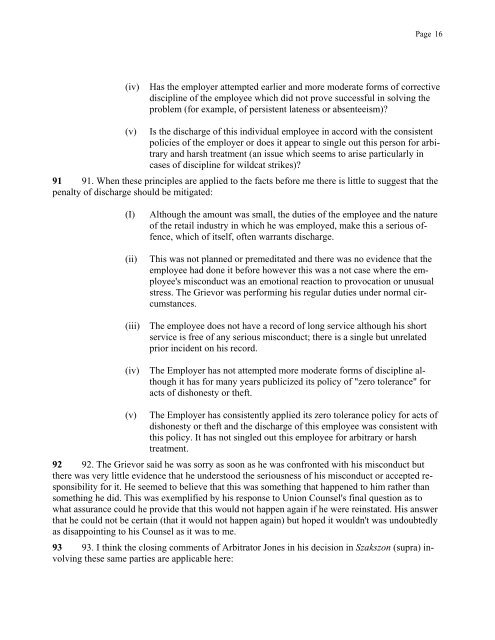FAQ's Cases - Stewart McKelvey
FAQ's Cases - Stewart McKelvey
FAQ's Cases - Stewart McKelvey
- No tags were found...
You also want an ePaper? Increase the reach of your titles
YUMPU automatically turns print PDFs into web optimized ePapers that Google loves.
Page 16(iv)Has the employer attempted earlier and more moderate forms of correctivediscipline of the employee which did not prove successful in solving theproblem (for example, of persistent lateness or absenteeism)?(v) Is the discharge of this individual employee in accord with the consistentpolicies of the employer or does it appear to single out this person for arbitraryand harsh treatment (an issue which seems to arise particularly incases of discipline for wildcat strikes)?91 91. When these principles are applied to the facts before me there is little to suggest that thepenalty of discharge should be mitigated:(I)(ii)Although the amount was small, the duties of the employee and the natureof the retail industry in which he was employed, make this a serious offence,which of itself, often warrants discharge.This was not planned or premeditated and there was no evidence that theemployee had done it before however this was a not case where the employee'smisconduct was an emotional reaction to provocation or unusualstress. The Grievor was performing his regular duties under normal circumstances.(iii) The employee does not have a record of long service although his shortservice is free of any serious misconduct; there is a single but unrelatedprior incident on his record.(iv)The Employer has not attempted more moderate forms of discipline althoughit has for many years publicized its policy of "zero tolerance" foracts of dishonesty or theft.(v) The Employer has consistently applied its zero tolerance policy for acts ofdishonesty or theft and the discharge of this employee was consistent withthis policy. It has not singled out this employee for arbitrary or harshtreatment.92 92. The Grievor said he was sorry as soon as he was confronted with his misconduct butthere was very little evidence that he understood the seriousness of his misconduct or accepted responsibilityfor it. He seemed to believe that this was something that happened to him rather thansomething he did. This was exemplified by his response to Union Counsel's final question as towhat assurance could he provide that this would not happen again if he were reinstated. His answerthat he could not be certain (that it would not happen again) but hoped it wouldn't was undoubtedlyas disappointing to his Counsel as it was to me.93 93. I think the closing comments of Arbitrator Jones in his decision in Szakszon (supra) involvingthese same parties are applicable here:
















